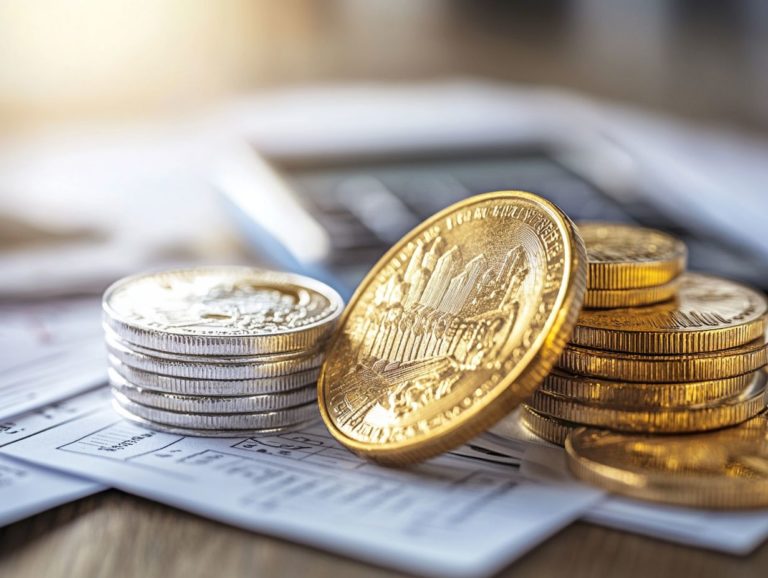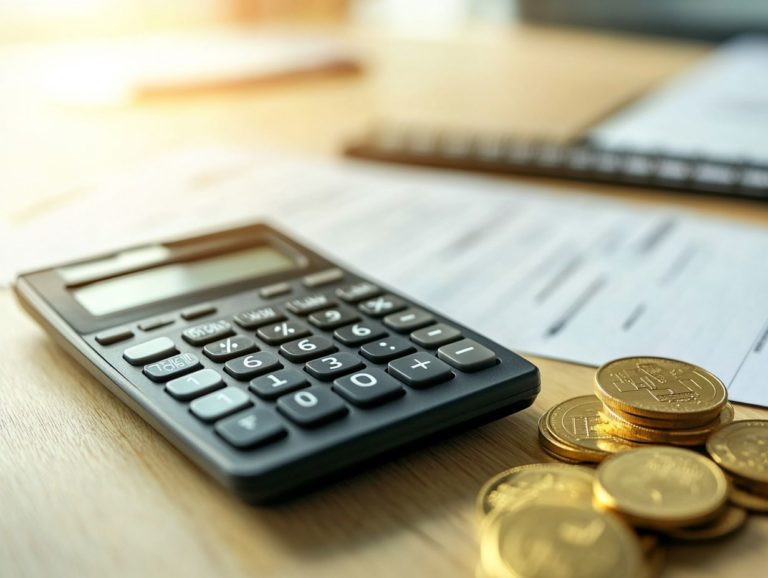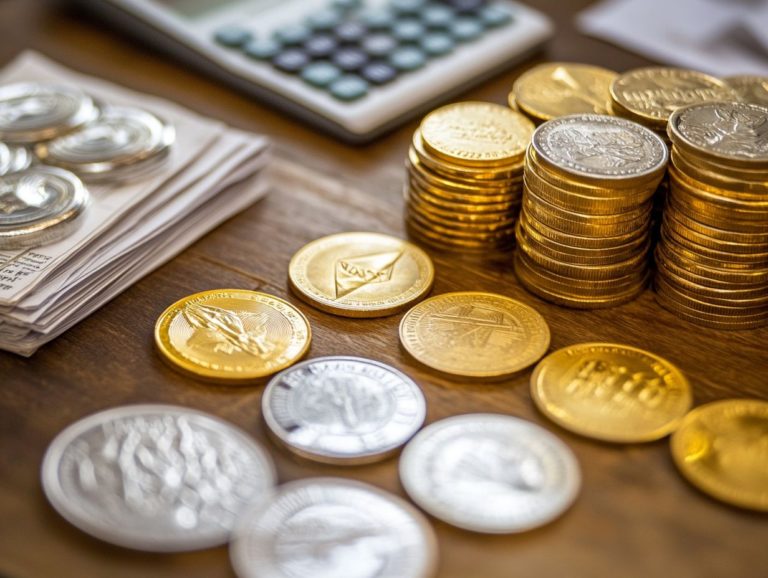How to Navigate Complex Tax Issues with Precious Metals
Jump into the world of precious metals investing! Understanding tax implications is crucial for maximizing your returns. This article simplifies the essential tax laws and regulations, covering everything from capital gains to reporting requirements.
Whether you re buying, selling, or holding precious metals in tax-advantaged accounts, you ll discover strategies to optimize your investments effectively. We ll also tackle the complexities of international taxation and highlight the advantages of collaborating with a tax professional.
Prepare yourself to navigate the intricate landscape of precious metal taxation with confidence and clarity!
Contents
- Key Takeaways:
- Understanding Taxation on Precious Metals
- Tax Considerations for Buying and Selling Precious Metals
- Maximize Your Returns with Smart Tax Strategies on Precious Metals
- Navigating International Taxation
- Reporting Requirements for Foreign Holdings
- Working with a Tax Professional
- Frequently Asked Questions
- 1. What are some common complex tax issues associated with investing in precious metals?
- 2. Do I have to pay taxes on my precious metals investments?
- 3. How can I minimize my tax liability when investing in precious metals?
- 4. Are there any tax benefits to investing in precious metals?
- 5. What are the tax implications of buying and selling physical precious metals versus investing in precious metals through an exchange-traded fund (ETF)?
- 6. How should I keep track of my precious metals investments for tax purposes?
Key Takeaways:
- Be aware of tax laws and regulations surrounding precious metals to avoid penalties and fines.
- Consider tax implications when buying and selling precious metals, including capital gains and reporting requirements.
- Utilize tax-advantaged accounts and plan for inherited metals to minimize tax burden.
Understanding Taxation on Precious Metals
Understanding the taxation on precious metals like gold, silver, platinum, and palladium is essential for you as an investor aiming to understand your tax responsibilities clearly. In the United States, the IRS categorizes these assets as collectibles, which carries specific tax implications that can influence your overall investment strategy.
You need to be aware of capital gains tax, various reporting requirements, and the importance of adhering to tax laws to steer clear of tax evasion. Collaborating with a tax professional can significantly enhance your tax planning efforts, enabling you to make informed decisions regarding your investments in precious metals, including understanding the tax implications of transferring precious metals.
Overview of Tax Laws and Regulations
The landscape of tax laws and regulations surrounding precious metals can be quite intricate. It is essential for you to have a clear understanding of your tax obligations to ensure compliance.
Navigating this complex area is crucial for any investor in gold, silver, platinum, or palladium. Understanding the relationship between precious metals and capital gains tax is essential, as each of these metals carries distinct implications that can significantly impact your overall investment returns.
For instance, while gold is often treated as a collectible and is subject to a higher tax rate, silver may be taxed differently based on how it is purchased and sold. Recognizing these nuances not only helps you meet legal requirements but also plays a vital role in shaping effective tax planning and optimizing your investment strategies.
With the right knowledge, you can mitigate losses and enhance profitability in your precious metal ventures.
Tax Considerations for Buying and Selling Precious Metals
When you venture into buying and selling precious metals, grasping the tax considerations like capital gains and losses is crucial for optimizing your investment strategies. This knowledge ensures you not only maximize your returns but also meet your tax obligations with confidence.
Capital Gains and Losses
Understanding capital gains and losses is crucial for you as an investor in precious metals, as they significantly impact your tax liabilities and overall financial health.
Navigating the complexities of capital gains tax calculations can often seem daunting, especially with the constant fluctuations in precious metal prices. When you sell these assets for more than you paid, those realized profits are subject to taxation. For more information, here’s what investors need to know about gold tax laws.
It’s important for you to recognize that losses from other investments can be strategically utilized to offset gains from your precious metals, potentially alleviating your tax burdens. To further minimize tax implications, consider holding onto your metals for longer periods to qualify for more favorable long-term capital gains rates, or explore tax-advantaged accounts for your purchases. Additionally, familiarize yourself with tax reporting for precious metals investments to ensure compliance and optimize your tax strategy.
These savvy strategies enable you to manage your tax responsibilities more effectively, ultimately enhancing your financial well-being.
Reporting Requirements
Navigating the reporting requirements for precious metals can feel like a maze. Essential forms like Form 1099-B, Schedule D, and Form 8949 help you understand tax compliance.
These documents are crucial for accurately tracking gains and losses from your transactions. They ensure that every profit reaches the IRS. Typically, align your submission timeline with the standard tax filing schedule, though deadlines can vary based on your situation.
It’s vital for traders and collectors to keep meticulous records throughout the year. This diligence streamlines your tax filings and acts as a safeguard against potential audits and unwarranted allegations of tax evasion.
Proper documentation paints a clear financial picture, supporting your journey toward legally accumulating wealth through precious metals.
Maximize Your Returns with Smart Tax Strategies on Precious Metals
Implementing effective tax strategies for holding precious metals can greatly elevate your investment returns while ensuring you meet your tax obligations. Utilize methods like tax-advantaged accounts to optimize your financial approach and enjoy the benefits of smart investing.
Tax-Advantaged Accounts
Tax-advantaged accounts like IRAs and Roth IRAs offer significant advantages for investors in precious metals. They allow for either tax deferral or tax-free growth.
These accounts enable you to include gold, silver, platinum, and palladium in your investment portfolio while reaping valuable tax benefits. Traditional IRAs facilitate tax-deferred growth, meaning any earnings from your investments won’t be taxed until withdrawals, typically during retirement. Roth IRAs offer the perk of tax-free growth if you hold the funds for several years and meet specific conditions.
Strategically incorporating these accounts into your investment strategy can potentially reduce your tax burden and maximize returns over time, aligning your investments with your long-term financial aspirations.
Tax Planning for Inherited Metals
Effective tax planning for inherited metals is essential, as it carries unique tax implications and potential liabilities that can significantly affect you as an heir.
Understanding the complexities of estate planning is crucial to ensure you fully grasp your responsibilities. Precious metals, unlike other assets, can trigger specific capital gains taxes when sold or transferred, making it imperative to be informed.
Explore options like establishing a trust for managing these valuables. This method enhances tax efficiency and helps preserve wealth across generations.
You can also consider gifting during your lifetime or utilizing exemptions for certain valuations to yield substantial financial advantages. Weaving these tactics into a comprehensive estate plan can effectively reduce your tax burden and ensure a smoother transition, ultimately securing greater financial stability.
Navigating international taxation adds a nuanced layer of complexity for you as an investor in precious metals. Consider the implications of buying and selling overseas, along with the specific reporting requirements for your foreign holdings. This landscape demands careful attention and expert guidance.
Implications of Buying and Selling Overseas
You need to grasp the implications of buying and selling precious metals overseas. These transactions can lead to different tax ramifications and require meticulous adherence to international tax laws.
Understanding these complexities is essential; failing to comply can result in steep penalties and might tarnish an otherwise lucrative investment. Different countries have distinct regulations regarding the export and import of precious metals, so staying updated on shifts in the effect of inflation on precious metals taxation is crucial.
The volatility of market conditions and evolving compliance standards present additional challenges to be mindful of. This knowledge safeguards your financial interests and cultivates trust and credibility in your global trading relationships.
Reporting Requirements for Foreign Holdings
Understanding the reporting requirements for foreign holdings of precious metals is crucial for maintaining compliance with tax laws and avoiding potential penalties.
If you possess foreign assets, it’s essential to become familiar with forms like the Foreign Bank Account Report (FBAR) and IRS Form 8938. These forms require careful attention and comprehensive disclosure of all financial accounts held outside the United States.
Accurate record-keeping goes beyond just meeting compliance requirements. It serves as a safeguard against discrepancies that could lead to audits or fines. Maintain thorough documentation of your transactions and holdings to ensure adherence to regulations and gain peace of mind while navigating the complexities of international precious metal investments.
Working with a Tax Professional
Working with a tax professional can transform your experience as an investor in precious metals. Their expert guidance on tax planning helps you navigate your obligations with confidence, ensuring efficient and effective management of your investments.
Benefits of Seeking Professional Advice
Seeking advice from a qualified tax expert can significantly enhance your financial strategy. They provide tailored tax planning that aligns with your financial goals while ensuring compliance with relevant tax laws.
Consulting an expert in tax regulations specific to precious metals is particularly beneficial. These professionals have a deep understanding of the unique tax implications tied to buying, selling, and storing these assets, ensuring you don’t overlook potential deductions or credits. For more insights, learn how to navigate tax implications of precious metals.
They can navigate the complexities of capital gains taxes, offering insights that could improve the overall performance of your investment portfolio. By leveraging their expertise, you can make informed decisions, effectively minimizing liabilities while maximizing returns.
Frequently Asked Questions
1. What are some common complex tax issues associated with investing in precious metals?
Common tax issues include determining the correct tax rate for gains on precious metals, understanding the difference between short-term and long-term gains, and navigating tax implications from international investments.
2. Do I have to pay taxes on my precious metals investments?
In most cases, yes. Just like any other type of investment, gains from precious metals are subject to taxes. However, the specific tax rate and regulations may vary depending on your individual circumstances.
3. How can I minimize my tax liability when investing in precious metals?
One way to minimize taxes on precious metals investments is to hold onto them for at least a year before selling. This can qualify you for the lower long-term capital gains tax rate instead of the higher short-term rate.
4. Are there any tax benefits to investing in precious metals?
Yes, certain tax benefits are associated with precious metals investments, such as deducting losses from other investments, using precious metals as a tax shelter, and potentially avoiding specific taxes on international investments.
5. What are the tax implications of buying and selling physical precious metals versus investing in precious metals through an exchange-traded fund (ETF)?
The tax implications may differ between physical precious metals and ETFs. For example, with physical metals, you may be subject to sales tax upon purchase and capital gains tax upon sale. With ETFs, you may only be subject to capital gains tax upon sale.
6. How should I keep track of my precious metals investments for tax purposes?
It’s important to maintain thorough and accurate records of your precious metals investments, including purchase and sale dates, amounts, and any associated taxes or fees. This will simplify reporting these investments on your tax return and help ensure you pay the correct amount of taxes.
For the best outcomes, consult a tax professional promptly to enhance your investment strategy and navigate the complexities of tax obligations related to precious metals.














